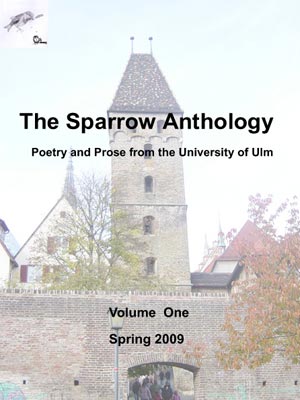Vorwort

The creative writing class in the winter semester of 2008-2009 was intended to provide students with the opportunity to do just that: write creatively. The initial purpose was to present the students with enough of the theory, backed up by exercises, to help them to turn in work at the end of the semester for evaluation in the form of a short story, short drama, poem, and so on.
Having spent the first few weeks on theory, and having provided the students with a couple of short writing assignments (titles and first paragraphs, perspective, narrated memory, character, etc), I gave them the task of writing a short crime story of about 2,000 words. The idea was this. In class, we brain-stormed and came up with a framework for the story. It should be hard-boiled, preferably a first-person narrative crime story involving a private detective who arrives at work one day to find his secretary on the street outside his building killed by a flowerpot. The police arrive and suspect the PI, who knows the crime must have been committed by a criminal he helped convict in the past who is now bent on revenge. There was to be pursuit and an eventual showdown. All the students had to keep within this framework, but developing plot, action character and dialogue themselves.
Having set the task, I sat back and hoped I wouldn’t be presented with assignments which were clichéd replicas of each other. I wasn’t. The stories were remarkably varied and well-written, keeping within the parameters of the task. The first four stories in Sparrow illustrate the high quality of the writing in this task.
Flushed with the students’ success, I decided to make the task harder. Their next assignment was to either write a locked room mystery or a spoof on Knox’s “Decalogue”. Let me explain.
The locked room mystery is a sub-genre in mystery fiction made popular in the 1920s and 1930s. It can be defined as any crime committed in such a way that it seems to be impossible to determine how it was done. The master of this genre is arguably John Dickson Carr. Monsignor Ronald A. Knox (1888-1957) was a British clergyman, editor, a literary critic, a humorist and a detective story writer himself who nicely laid out the "ten rules" that should guide detective fiction in its so-called Golden Age, the same time as the locked-room mystery was in its heyday. The rules are as follows:
1. The criminal must be someone mentioned in the early part of the story, but must not be anyone whose thoughts the reader has been allowed to follow.
2. All supernatural or preternatural agencies are ruled out as a matter of course.
3. Not more than one secret room or passage is allowable.
4. No hitherto undiscovered poisons may be used, nor any appliance which will need a long scientific explanation at the end.
5. No Chinamen must figure in the story.
6. No accident must ever help the detective, nor must he ever have an unaccountable intuition which proves to be right.
7. The detective must not himself commit the crime.
8. The detective must not light on any clues which are not instantly produced for the inspection of the reader.
9. The stupid friend of the detective, the Watson, must not conceal any thoughts which pass through his mind; his intelligence must be slightly, but very slightly, below that of the average reader.
10. The stupid friend of the detective, the Watson, must not conceal any thoughts which pass through his mind; his intelligence must be slightly, but very slightly, below that of the average reader.
Again, I wasn’t disappointed, although this time it took rather longer for the assignments to arrive in my inbox….
The results, I think, speak for themselves, and I can safely say that the first issue of The Sparrow Anthology – a crime special, if you will – is a statement of the creativity and quality of students’ writing here and the University of Ulm. We hope to continue this success with each of our following issues appearing in the summer, autumn and winter of this year – and naturally all our issues in the years to come!
Diese Ausgabe ist zur Zeit leider vergriffen.
Kontakt
Zentrum für Sprachen und Philologie
Raum: N24/158
Anschrift:
Zentrum für Sprachen und Philologie
an der Universität Ulm
Albert-Einstein-Allee 11
89069 Ulm
Telefon: +49 (0)731/50-23465
Telefax: +49 (0)731/50-23467
